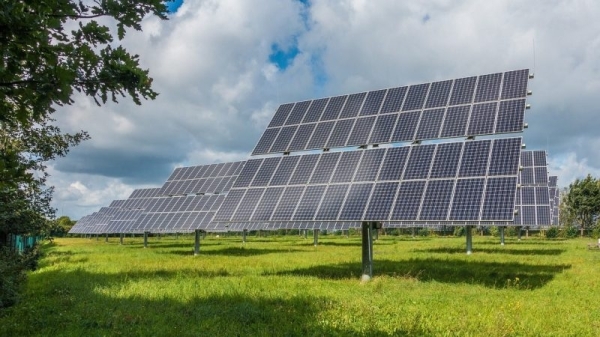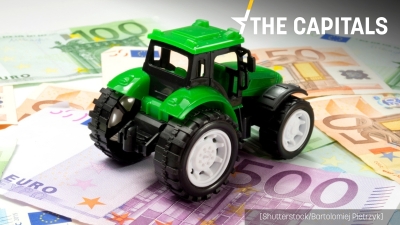Study: Stronger policy drive needed for green alternatives to replace Russian gas by 2028

While it would be possible and beneficial for Europe to replace Russian fossil gas supplies with green alternatives by 2028, it will require significant investment, upskilling and policy improvements, according to a study by the Oxford Sustainable Finance Group.
The report, titled ‘The Race to Replace: the economics of using renewables to free Europe from Russian gas’, weighs up the costs and benefits of entirely replacing pre-war levels of Russian gas imports with green alternatives in the next five years.
According to the analysis, this would help Europe reach its climate goals, improve energy security and aid the EU industry. But it is out of reach if Europe fails to put the correct drivers in place, it warns.
“It is entirely possible to replace Russian natural gas with green technologies by 2028,” reads the report, but “this will require a more conducive policy environment, including faster permitting for renewable electricity, diversified and secure supply chains, widespread weatherisation of facilities and a supportive subsidy and financing ecosystem”.
“Our key finding is that policymakers, by enacting and implementing plausibly ambitious policies, can replace Russian gas in electricity and heating in the next five years and simultaneously achieve the twin goals of energy security and climate mitigation in an expedited manner,” it adds.

Energy battle won, but fight not over, says EU energy chief
The EU has successfully made it through the winter despite Russia’s attempts to disrupt its gas supplies, but there is still a lot of work needed to protect future energy security, said EU energy commissioner Kadri Simson on Monday (27 February).
Making the transition a reality
Following Russia’s invasion of Ukraine in February 2022, the EU proposed a plan to ditch all fossil energy imports from the country.
Since, imports of Russian gas have fallen significantly, but much has been replaced by pricey, carbon-emitting alternatives, landing Europe with hefty bills and polluting energy sources.
“The EU’s imports of gas from Russia have already fallen by three-fourths from the levels preceding Russia’s invasion of Ukraine,” said Lauri Myllyvirta, lead analyst at the Centre for Research on Energy and Clean Air.
“However, much of this gas has been replaced by imports from other countries, leaving the Union’s energy supply vulnerable to future geopolitical and supply shocks and continuing to fuel climate change,” she added.
To switch to green alternatives, European policymakers need to focus on four key areas, according to the analysis.
Firstly, public and private funding is needed to reach the massive rollout of renewables and heat pumps. This includes creating a supportive subsidy and financing environment for green technologies as well as additional policy measures, like those to boost the deployment of rooftop solar.
The total investment need is steep, coming in at €811 billion for capital expenditure, but while this is significantly higher than the business-as-usual scenario, the report argues that massive savings could be made by avoiding expensive gas purchases.
“Replacing natural gas with wind and solar energy eliminates the need to pay for gas in future,” said Gireesh Shrimali, co-author of the report and head of transition finance research at the Oxford Sustainable Finance Group.
“By eliminating reliance on importing a fossil fuel with volatile prices and supply, the EU can alleviate energy security concerns, address the cost-of-living crisis through energy costs, and advance its goals to achieve net zero emissions and tackle the climate crisis,” he added.
Alongside making finance available, policymakers need to ensure that Europe has the skilled workers it needs to install and maintain green technology.
The European Union has a significant skills gap and has already started work to plug it, with several skills partnerships created with the industry to train workers.
According to the analysis, Europe must also address the security of its supply chains. For example, there are growing concerns that the EU is over-reliant on countries like China for renewable technology materials, such as lithium and rare earths, leaving the bloc vulnerable to supply disruptions.
Finally, Europe’s permitting procedures need to be sped up and its electricity networks improved to accommodate the required surge in green energy. Many renewable projects are stuck in permitting processes, while others are curtailed due to a lack of grid capacity.
Reacting to the report, Laurence Tubiana, the CEO European Climate Foundation, called on Europe’s biggest gas importers, Germany, Italy and France, to “take advantage of cheap, secure and clean renewable energy for their citizens, while undercutting Russia’s war efforts”.
“This analysis underscores that renewables and energy efficiency are not a distant dream, but an immediate economic, energy secure and ethical path away from expensive Russian gas,” she added.

Beleaguered wind industry turns to European governments for help
While European governments boost their wind power ambitions, the industry is struggling with rising production costs and growing competition from China.
Read more with EURACTIV




